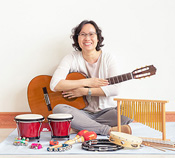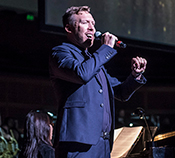Bringing more of Music's Potential to the World.
(Part 2)
Kate Eberstadt / Artist, Community Supporter
Music as a Common Language.
Kate Eberstadt started The Hutto Project with the desire to bring the community-harnessing power of music—something she had learned from her mentor—to children living as refugees in Germany. We asked Kate how successful the project was in bringing change and how her experience with the project has reshaped her own beliefs on what music can do.
Music has positive impacts on life.
Once the documentarians and I had come together in Berlin, our first step was to arrange visits to the refugee camps to find a place for our program to take rootOne smaller camp asked us to come to talk to them about the program. This was a camp with 170 people, 40 of them children. When we visited, they asked us to present the project to the people living in the camp. Smiles broke out across their faces when they realized what the project would be about—music. They started asking questions:
"Can you teach guitar?"
"How about piano?"
"And singing?"
We started to hold music and performing arts class three times a week in a space provided by the Red Cross. Twenty-five children from Syria, Afghanistan, Iraq, Palestine, and Moldova, ranging in age from 3 to 14, signed up. Our focus was to encourage communication between children who might have trouble relating to one another. We also encouraged them to begin to take leadership positions in the classroom, from leading warm ups to taking notes on the board to teaching songs of their own. When the children felt comfortable with their knowledge of music notation and scales, they wanted to teach other people in the emergency camp. I remember hearing the voice of a little girl telling the security guard stationed outside the classroom what a major second was, which she had just learned. Once again, the truth Benjamin Hutto had taught me played out in real life: music has the power to build community, bridging cultural and social barriers.

From Whispering to Singing.
There was a six-year-old girl from Syria among the children who showed up for the program. She had visible scars from an explosion. When we first saw her, she was very quiet, mostly speaking in whispers. She watched in wary silence as we organized the group for our first rehearsals. We kept asking her to join us. Eventually, she agreed to take part in the classes after several weeks, but she was still holding back, watching quietly from the sidelines. Week by week, she seemed to grow more interested in the music and more comfortable. One day, she raised her hand and volunteered to pair up with an older child for a mirroring exercise. From that point forward, she joined every class and activity. Even in the vocal exercises, where once she had whispered, she sang out boldly with a smile. By the end of the project, her behavior in our classroom had changed completely: she was one of the most active participants and strongest leaders in the class. It was a moving experience to watch her development and example for everyone, from her fellow classmates to volunteers to program staff.

Music connects people into a community.
In the six-month period that the project ran, 80 volunteers came to Berlin from around the world to give their support. Guest artists donated their time and skills in specialized workshops, including several focused on dance, music composition, and drama. One of my fondest memories was our final performance, an evening of music and celebration we held with the children and their families, ending with traditional cooking from their home countries. In July 2016 we held our last rehearsal to mark the end of the project, and the refugee camp was disbanded six months later in the winter. Back in my life in the United States, I think of those children every day.
When we started the project, children brought together from different cultures lacked a common language with which to communicate and share. The same held true for the volunteers and staff. Music and performing arts became that common language.
I am determined to continue exploring the power of music and performing arts as a means to forge community, and exploring the boundaries of what music can do for others and our world.

- Kate Eberstadt / Artist, Community Supporter
- Kate Eberstadt is an artist currently living in New York and musician practicing singing, piano, composition, and choral music. After apprenticing with Robert Wilson at the Watermill Center, Kate founded The Hutto Project, a community art project harnessing the power of music and performance as a source of hope for refugee children living in Berlin.
Interview Date:



